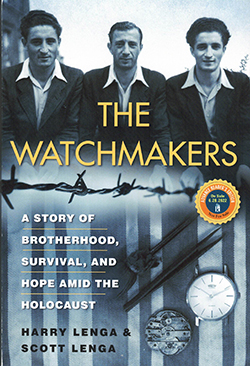The Watchmakers: A Story of Brotherhood, Survival, and Hope Amid the Holocaust by Harry Lenga and Scott Lenga; New York: Citadel Press © 2021, 2022; ISBN 9780806-54194; 315 pages including appendices, glossary, sources, endnotes, photo credits, and acknowledgments, $27.95.
By Donald H. Harrison

 SAN DIEGO – Here is a Holocaust memoir that is so well told that you feel like you are sitting in the room with Harry Lenga, listening to him as he relates the meaningful episodes of his life. His narrative, as transcribed and edited by his son Scott, is at times folksy, other times philosophical, and always interesting.
SAN DIEGO – Here is a Holocaust memoir that is so well told that you feel like you are sitting in the room with Harry Lenga, listening to him as he relates the meaningful episodes of his life. His narrative, as transcribed and edited by his son Scott, is at times folksy, other times philosophical, and always interesting.
Three Lenga brothers from Kozhnitz, Poland, managed to stay together throughout the Holocaust years, their youth, willingness to work, and strength leading to them being chosen to work in Nazi slave camps rather than to be murdered in death camps. The fact that they stayed together helped them keep their spirits up. While people on their own became depressed, cut off, and feeling they had nothing to live for, the brothers lived for each other. Whenever one stumbled, the others were there to lift him up.
More than that, however, was their willingness to use their talents as watchmakers to curry favor with block captains and camp subalterns. They told their captors that they wanted to do something nice for them, like fixing their watches if ever the need should arise. Somehow, in Harry’s telling, watches were among the earliest non-human casualties of war. They always seemed to run down and tell false time. The Lenga brothers disassembled them, cleaned them, and, if possible, cannibalized other non-working watches to replace parts for their “customers.”
On more than one occasion, word spread among the authorities that here were three very useful young men. Instead of being sent out of the camp and sapping their strength moving rocks from here to there, and back from there to here, the brothers were sequestered in warm quarters at benches where they could work their trade.
No, they weren’t paid for their efforts, but favors came their way: more to eat, meaning more chances to survive; remaining warm instead of getting frostbite or pneumonia in the below freezing temperatures of the European winter, and often being permitted to work together as a team.
Through luck, calculated risks, and the feeling that every day they remained alive was a welcome bonus, the brothers survived the war, rallied back to health in Displaced Person’s camps, and eventually enjoyed successful post-war lives.
Even if you have read other Holocaust memoirs before, reading this one will be well worth your time. Harry’s positivity, optimism and seichel are truly inspiring.
*
Donald H. Harrison is editor emeritus of San Diego Jewish World. He may be contacted via donald.harrison@sdjewishworld.com